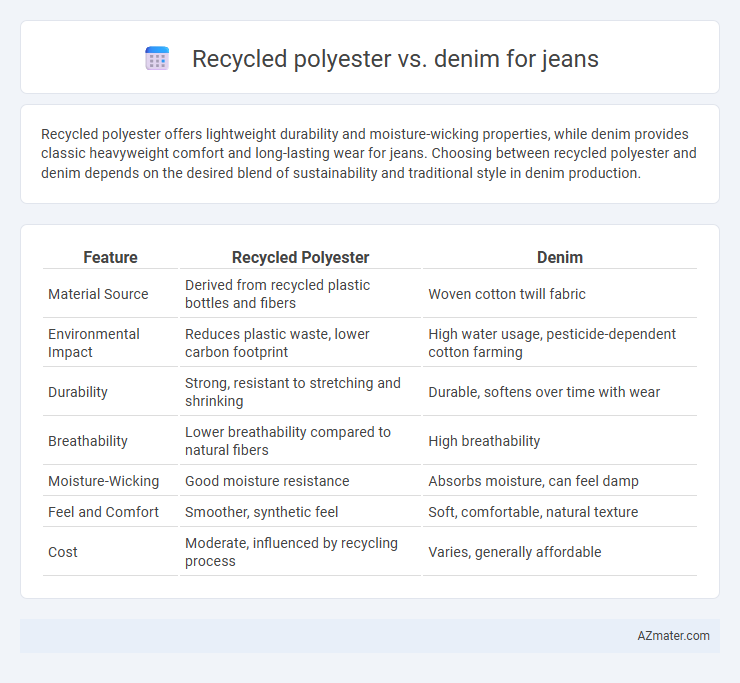Recycled polyester offers lightweight durability and moisture-wicking properties, while denim provides classic heavyweight comfort and long-lasting wear for jeans. Choosing between recycled polyester and denim depends on the desired blend of sustainability and traditional style in denim production.
Table of Comparison
| Feature | Recycled Polyester | Denim |
|---|---|---|
| Material Source | Derived from recycled plastic bottles and fibers | Woven cotton twill fabric |
| Environmental Impact | Reduces plastic waste, lower carbon footprint | High water usage, pesticide-dependent cotton farming |
| Durability | Strong, resistant to stretching and shrinking | Durable, softens over time with wear |
| Breathability | Lower breathability compared to natural fibers | High breathability |
| Moisture-Wicking | Good moisture resistance | Absorbs moisture, can feel damp |
| Feel and Comfort | Smoother, synthetic feel | Soft, comfortable, natural texture |
| Cost | Moderate, influenced by recycling process | Varies, generally affordable |
Understanding Recycled Polyester: An Overview
Recycled polyester is produced by processing plastic waste, such as PET bottles, into fibers suitable for fabric production, significantly reducing reliance on virgin petroleum resources. This material offers high durability, moisture-wicking properties, and lower environmental impact compared to traditional polyester, making it increasingly popular in sustainable fashion. In comparison, denim, commonly made from cotton, involves intensive water and pesticide use, whereas recycled polyester provides an eco-friendly alternative with a smaller carbon footprint for jeans production.
What Makes Denim Unique for Jeans?
Denim stands out for jeans due to its distinctive twill weave, offering durability and a textured surface that enhances comfort and style. The indigo dye used in denim creates a unique fading pattern over time, contributing to a personalized aesthetic that recycled polyester cannot replicate. Its breathability and color retention make denim a preferred fabric for long-lasting, fashionable jeans.
Environmental Impact: Recycled Polyester vs Denim
Recycled polyester used in jeans significantly reduces reliance on virgin petroleum and lowers CO2 emissions by up to 75% compared to conventional polyester production, supporting a circular fashion model. Denim production, especially when using conventional cotton, demands high water consumption--averaging 7,000 liters per kilogram of fabric--and intensive pesticide use, contributing to soil degradation and water pollution. Choosing recycled polyester over traditional denim can mitigate resource depletion and environmental pollution, making it a more sustainable option for eco-conscious apparel manufacturing.
Production Processes Compared
Recycled polyester jeans involve processing post-consumer plastic waste like PET bottles into fibers, significantly reducing raw material extraction and energy consumption compared to virgin polyester. Denim production, traditionally made from cotton fibers, requires intensive water use, extensive pesticide application, and longer cultivation periods, impacting environmental sustainability. While recycled polyester uses a closed-loop chemical or mechanical recycling process, denim production relies on agricultural practices and energy-intensive dyeing and finishing methods.
Material Durability and Longevity
Recycled polyester offers superior durability and resistance to abrasion compared to traditional denim, making it less prone to wear and tear over time. Denim, primarily cotton-based, provides natural breathability and comfort but may fade and weaken faster with frequent washing and heavy use. Combining recycled polyester fibers with cotton in denim blends can enhance the jeans' longevity while maintaining comfort and sustainability.
Comfort and Wearability Factors
Recycled polyester offers moisture-wicking properties and quick drying, enhancing comfort in jeans during extended wear and physical activity. Denim, typically made from cotton, provides breathability and a natural softness that improves with washing, contributing to long-term wearability. Blended fabrics combining recycled polyester and denim optimize durability and stretch while maintaining comfort, making them increasingly popular in sustainable fashion.
Style and Design Versatility
Recycled polyester offers high flexibility in style and design, enabling vibrant colors, varied textures, and innovative patterns for jeans while maintaining durability and moisture-wicking properties. Denim, known for its classic appeal and rugged texture, provides timeless style with a wide range of washes and finishes that cater to both casual and fashion-forward looks. Combining recycled polyester with denim fibers enhances design versatility by blending sustainability with traditional aesthetics, resulting in jeans that meet diverse fashion demands.
Cost Considerations for Manufacturers and Consumers
Recycled polyester in jeans production offers cost advantages by utilizing post-consumer plastic waste, reducing raw material expenses and energy consumption compared to traditional cotton denim. Denim made from conventional cotton tends to have higher water and pesticide-related costs, impacting overall manufacturing expenses and pricing for consumers. Manufacturers balancing sustainability and affordability may find recycled polyester blends a strategically economical choice, potentially leading to more competitively priced jeans for environmentally conscious buyers.
Care and Maintenance Differences
Recycled polyester jeans require less frequent washing due to their moisture-wicking and odor-resistant properties, which helps maintain fabric integrity longer compared to denim. Denim jeans, made from cotton, often need more careful washing to prevent shrinkage and color fading, typically requiring cold water and gentle cycles. While recycled polyester dries quickly and resists wrinkles, denim benefits from air drying to preserve its shape and avoid stiffness.
Future Trends in Sustainable Jeans Materials
Future trends in sustainable jeans materials highlight recycled polyester's growing role due to its lower environmental impact and ability to reduce plastic waste compared to traditional denim. Innovations in bio-based and recycled denim fabrics aim to minimize water usage and chemical treatments typically associated with cotton cultivation. Advancements in circular economy practices, such as fabric regeneration and closed-loop recycling, are expected to drive the adoption of eco-friendly materials in denim production.

Infographic: Recycled polyester vs Denim for Jeans
 azmater.com
azmater.com